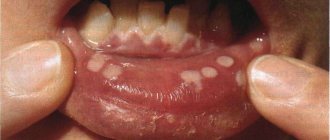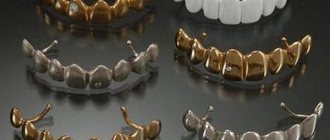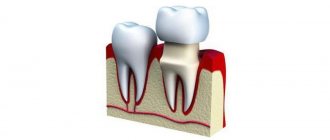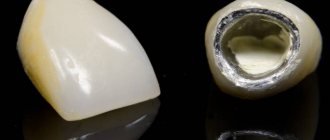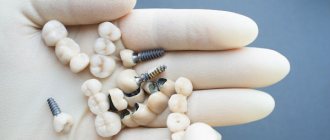Manufacturing
Metal-ceramic dentures are made according to the following scheme:
- The first step: the doctor, with the help of the patient, creates an impression of the future structure.
- Second step: the doctor gives this impression to the dental technician.
- Third step: the dental technician creates a model of future crowns.
- Fourth step: the doctor tries the model on the patient’s teeth.
- Fifth step: if there are any shortcomings, the model is sent back for technical modification. If everything fits perfectly, a ceramic layer is applied on top of the frame.
- Sixth step: at the final stage, the crown is covered with a layer of glaze.
Basic principles of crown care
There are a few simple rules that you can follow to maximize the service life of your crowns:
- Brush your teeth twice a day. Use a slightly abrasive paste for this. Too aggressive compositions can damage the surface of the teeth and injure soft tissues.
- It is very important to pay attention to the spaces between teeth and the space under the hinged crowns of bridges. To do this, you can use special brushes and dental floss.
- You can use an irrigator. It will effectively remove everything unnecessary from the surface of the teeth, even in problem areas.
- It is important to monitor the condition of the joints between crowns and natural teeth. This is a kind of risk zone where problems first begin.
- It is worth giving up excessively solid foods. Hard crackers, candies, and nuts are not good for both natural and artificial teeth.
- Do not allow sudden temperature changes - from hot to very cold and vice versa. Such exposure can negatively affect the condition of the ceramics.
- Gum care plays a vital role. If inflammation, unpleasant odor, or discharge occurs, it is important to immediately seek the advice of a dentist.
- You need to brush not only your teeth, but also your tongue. Unwanted microorganisms also accumulate on its surface.
Dental care is practically no different from regular oral care. Careful hygiene and timely visits to the dentist are the key to oral health and the longevity of dentures.
What are metal-ceramic crowns?
Using the spraying or casting method, crowns and bridges are made from metal ceramics. As a rule, this material is used to restore lost units of the chewing group. Metal-ceramic raw materials make it possible to restore the aesthetic appearance and functionality of teeth.
Thanks to their special strength, metal-ceramic crowns are not afraid of even the hardest products. However, when exposing dentures to serious mechanical stress, for example, trying to crack a nut shell, you need to be careful.
Despite their durability and wear resistance, the operation of metal-ceramic crowns is limited to certain periods. Prostheses made on the basis of ordinary metal can last on average 10-12 years. The service life of structures made from an alloy of gold and platinum is at least 15 years. In any case, it is worth remembering that metal-ceramic dental crowns will last a long time only if they are properly cared for and treated with care.
Care instructions
Despite the fact that metal-ceramic teeth do not require special care, they must be cleaned daily and thoroughly, this is the only way to be sure of a long service life of the prosthesis without unpleasant surprises. Simple but effective recommendations for caring for dentures:
- crowns must be cleaned using vertical sweeping movements from the gums to the cutting edge,
- choose a brush with soft bristles so as not to injure the mucous membranes,
It is recommended to use an irrigator.
If possible, buy an irrigator. This is a special device that creates a thin stream of water under high pressure, washing away plaque and food debris from the most inaccessible areas. The irrigator also provides effective massage of the gums, cleanses the tongue and mucous membranes.
Indications
Metal-ceramic dentures are installed on real teeth or, if they are missing, on implants. In any case, the following indications exist:
- Defect of existing crowns. For example, the crown became deformed, the shine was lost, and the color changed greatly.
- Destruction of crowns. That is, complete destruction of the outer shell of the tooth has occurred and it is simply impossible to restore it with the help of dental inlays or fillings. The characteristics of the disease do not allow it.
- Defects of the entire dentition.
- The patient has pathological abrasion of the covering of the teeth.
- The need to restore chewing function and natural teeth.
- Inconsistency of existing dental structures with aesthetic requirements. This can be said about bridges, plastic crowns, metal crowns and combined devices.
- There is a need to restore two or more teeth with a dental bridge.
- Anomaly of tooth growth, when other methods of eliminating this defect are unacceptable.
You should not use metal ceramics if:
- The patient has a clearly expressed or may experience an allergic reaction to the implanted structure.
- The patient's crown part of the tooth is shortened.
- Convergence of teeth is observed.
- You cannot place metal-ceramics on a diseased tooth. It must first be completely cured.
- If the patient grinds his teeth at night (bruxism).
- Periodontium is visible on the teeth.
- There are obvious defects in the dentition over a long distance.
Main rules of care
Crown care is easy. And hygiene procedures are in many ways similar to cleaning real teeth. During the cleaning process, it is necessary to pay attention to cleansing the surface of the tongue. This is important because pathogens accumulate in the papillae.
Plaque accumulation usually occurs in the following areas:
- In the area of close contact between teeth, including dentures.
- On the surface of molars, in the sockets of incisors and canines.
- Near the ducts of the salivary glands.
- In the interdental space (flosses - dental floss are used to clean it).
- On the surface of the gums and tongue.
Plaque must be removed regularly - morning and evening, otherwise pathogenic microorganisms will begin to form microbial plaques, which can later develop into carious cavities. If plaque accumulates on dentures, caries will not develop, but the danger of an inflammatory process on the gums increases significantly; microbes begin to actively develop throughout the entire oral cavity. Therefore, cleaning dentures is necessary to prevent diseases of the oral cavity, diseases of the digestive system and even allergic diseases.
After prosthetics, a specialist should usually tell you how to care for the crowns. It is recommended to purchase an electric toothbrush. With the help of such a device, cleaning plaque on teeth will be easy, and this device also helps prevent the formation of tartar.
Removable dentures have their own rules for hygienic care - they should be removed before going to bed and cleaned so that plaque on the inner surface of the dentures does not negatively affect the gums and teeth. It has been noticed that plaque accumulation on the surface of artificial crowns occurs much faster, and the development of pathogenic microbes also occurs more actively. Therefore, cleansing procedures must be systematic and thorough.
Fixed dentures and implants often do not require any special cleaning methods. Hygiene procedures are similar to traditional care. It is recommended to use therapeutic and prophylactic toothpastes, and after eating, rinse the mouth with warm water, special rinses, and herbal decoctions.
After the prosthetic procedure, it is important to consult with a specialist who will tell you how to care for dental crowns. By following all the rules of care and regularly visiting a specialist, you can extend the life of the devices.
How to care for metal-ceramic dentures?
The operation of metal-ceramic prostheses is not particularly difficult: they need to be thoroughly cleaned and not subjected to strong mechanical stress. After the crowns are installed, the patient is advised by the doctor about how to care for metal-ceramic teeth. The owner of the dentures is also informed about the methods of cleaning metal-ceramic structures and the devices used for this.
In addition, items such as:
- Toothbrush. Her choice is coordinated with a specialist who will recommend the optimal type of handle configuration and advise which bristles are best to give preference to. In addition, the doctor will teach you the correct technique for cleaning crowns. If several structures are installed in the oral cavity, then the toothpaste should be low-abrasive and contain medicinal herbs or propolis.
- Floss. This special floss allows you to effectively clean the interdental space from food debris (see also: is dental floss beneficial or harmful?).
- Toothpick. It is a pointed stick made of wood or plastic, which is used to remove pieces of food stuck between the teeth.
- Ershik. This is a special device that allows you to clean out remaining food from the interdental spaces.
- Irrigator. Using the device, you can effectively perform oral hygiene procedures at home. The principle of its operation is simple: under the pressure of a stream of water, plaque and food debris between the teeth are removed, and the gums are massaged.
Experts recommend promptly implementing professional hygiene procedures to prevent plaque formation. The most popular dental service is electric sonic cleaning.
An important factor in caring for dentures is regular visits to the dentist to avoid the development of caries. It is important not only what the structures are cleaned with, but also how this is done. A doctor should show you how to properly brush artificial teeth.
Cleaning methods
If there are a large number of permanent crowns in the oral cavity, when choosing a toothbrush you need to focus only on your own preferences and the condition of your gums. Movements with the brush should be strictly vertical, from the gums to the denture.
When cleaning, pay special attention to the space between the teeth. Since a regular brush is not able to cope with this task, you need to use dental floss, a toothpick, a brush or an irrigator, the daily use of which is not necessary, just a few sessions a week are enough.
When dentures using a bridge structure, it is necessary to regularly clean the rinsing channel - the space between the gum and the bridge prosthesis. For this purpose, you can use an irrigator or a regular syringe with the needle removed. If this is not done, bad breath may appear after a short time.
As always, prosthetics takes place in several stages.
An X-ray examination is required. With its help, the dentist sees foci of inflammation that are invisible to the normal eye. He can also see other negative processes that have already existed and were previously treated. Found pathologies must be cured. There should be no consequences after them. Here you should know that metal-ceramic structures are mounted on absolutely healthy teeth.
If there is a need, then non-viable teeth are pulled out. Next, the gums and remaining teeth are treated. The examination of the patient and the planned budget finally leads to the process of prosthetics.
If the tooth has left behind roots, then the missing structure is restored using an inlay or a pin. The stump tab allows you to restore teeth even with significant destruction. The dentist determines its establishment at the stage of preparation for prosthetics. In almost fifty percent of cases, a pin is installed before tooth extension.
Before the crowns are installed, depulpation is carried out. This procedure causes quite a bit of controversy. The experience, qualifications, professionalism of the doctor and the modern equipment of the clinic itself are paramount here.
It is necessary. The grinding process is carried out in such a way that the tooth has a cone-shaped shape. The time that the patient will continue to walk with the crown depends on the quality of this stage.
While the impression and final crown are being made, the patient walks with the temporary one. It protects the tooth from infection, food and protects against force. Basically, such a crown is made of plastic. Another good thing about a temporary crown is that it allows you to maintain the aesthetics of an open mouth when speaking.
The finished prosthesis is attached using a special adhesive material, which not only perfectly adheres to the surfaces, but guarantees their strength.
It is possible to install a metal-ceramic crown without resorting to the pulp removal process. This is necessary for the following points. A living tooth with nerves is much better, more durable and of higher quality than one in which the nerves were removed. The pulpless one becomes very fragile over time. After a short time, the tooth may break under the influence of the metal-ceramic structure.
A tooth with nerves can withstand negative influences much more easily. These are the teeth that are least susceptible to caries.
By refusing depulpation, you can significantly reduce the price of prosthetics. That is, you can get beautiful teeth for less money. This method is said to cause much less harm to the patient than other procedures.
You should not worry about losing a healthy tooth with nerves. After all, it is not possible to return removed nerves.
Everyone knows that well-groomed and clean teeth will maintain their health for many years. The same can be said about artificial teeth made of metal ceramics. The same measures must be taken with them as with natural teeth. We remember all these events from childhood:
- Dentures with natural teeth must be cleaned morning and evening.
- In between major cleanings, they should be rinsed with a pharmaceutical solution or plain water. This should be done after snacks or other meals.
- You need to clean dentures and teeth with paste or powder. In special cases (when food remains are stuck), thread should be used.
If suddenly, while wearing metal-ceramic crowns, you begin to feel complications in the form of swelling of the gums, then you need to visit the dentist’s office. The doctor will determine the cause of the phenomenon and provide appropriate treatment. Particular attention should be paid to severe swelling, the slightest bleeding and serious foci of inflammation. These signs of infection are the most dangerous.
You can take preventive actions in advance. Products purchased at the pharmacy are quite suitable for this.
Prevention measures
The destruction of a tooth under the crown and the appearance of an unpleasant odor are not always the fault of the patient. But, in most cases, following the rules of oral care after dentures helps to avoid such unpleasant consequences.
Among the main recommendations of doctors are:
- brushing at least twice a day;
- the use of special additional products for thorough cleaning;
- complete nutrition, providing all the necessary nutrients for the body;
- getting rid of bad habits;
- rinsing the mouth with decoctions of medicinal herbs;
- compliance with the drinking regime (at least 2 liters per day);
- Immediately consult a doctor if unpleasant symptoms appear.
Specialty stores sell a wide variety of oral hygiene devices. It's easy to get confused in such an assortment.
To care for artificial crowns, doctors advise using the following items:
- long-haired brushes help remove food debris from hard-to-reach places;
- a tuft-shaped brush is specially designed to remove food particles around braces and crowns;
- Dental floss is used to clean between spaces;
- irrigator - a device that uses a stream of water to perfectly clean both hard-to-reach places and between teeth;
- Rinse aids with antibacterial action provide additional protection against the development of caries.
Using different hygiene devices will help keep your teeth clean and reduce the risk of food particles getting into hard-to-reach places. This condition is the main protection against the development of caries.
From the video, find out whether teeth under crowns always deteriorate.
Benefits of use
Metal-ceramic dentures have an impressive list of advantages:
- Great aesthetics. Many people are often referred for prosthetics not because of health issues, but because of aesthetic dissatisfaction. Metal-ceramic prostheses cope with this perfectly. An experienced technician will very professionally make artificial teeth, so that they will be quite difficult to distinguish from your own. In addition, the shape and color of the prosthesis will be in maximum harmony with its neighbors. The best effect is achieved if several teeth have to be treated at the same time.
- Complete hygiene. Such artificial teeth are able to completely repel the penetration of microbes and completely refrain from their influence. This is the biggest benefit for people with painful gums.
- Protecting the tooth itself. The metal frame of the crown is in very tight contact with the tooth. Therefore, the tooth will not be subject to further destruction. In addition, the tooth will be completely protected from the aggressive effects of the environment surrounding the tooth.
- Full functionality. Artificial teeth will perform their functions just like real teeth. A person will not experience a sense of difference when eating.
- Full biological compatibility. If the procedure for installing metal-ceramics was performed efficiently, then new crowns will not cause changes or unpleasant irritation in the gums. The health of the oral cavity and gums will not be affected.
- Reasonable price. If we compare the prices of non-metallic implants and prostheses, the price here is very pleasing. But metal ceramics exceed the prices of standard metal prostheses.
- Color fastness. The installation of metal ceramics does not impose restrictions on the use of dyeable products. Artificial dyes will not damage the enamel. Time will also not put a dark tint on artificial teeth.
- High strength. Such teeth are capable of withstanding quite large force loads, from which they cannot collapse. The chewing load is distributed correctly and evenly. As a result of this process, there is no risk of cracks and small chips appearing on the surface.
- Durability. If you follow the correct recommendations for hygiene and care in handling, then such prostheses will serve a person for more than 15 years.
Food gets under the crown: what to do
We have already said above that if there is an unpleasant odor from under the crown or food gets under the crown, these symptoms indicate the process of decay of the tooth tissue (carious tissue damage). No amount of rinsing or application can stop this process, and therefore, if you want to try to save the tooth, you need to urgently contact an orthopedic dentist.
It is only necessary to clarify that sometimes the smell from under the crown can be associated with the formation and suppuration of periodontal pockets. In this case, one of the symptoms may be redness of the gums around the crown, or there may be purulent discharge from periodontal pockets. It must be said that the formation of pockets near the crown occurs quite often, which can be associated both with prosthetic errors and due to poor oral hygiene.
Whitening metal-ceramic teeth at home
According to most experts, it is impossible to whiten teeth made of metal ceramics, since whitening agents can only affect natural enamel. For this reason, it is recommended to lighten teeth before the prosthetic procedure, then the color of the dentures will be matched to the shade of the bleached natural teeth.
Whitening of metal-ceramic structures can only be done when they are installed instead of units of the chewing group and are not visible when talking and laughing. At the same time, you can whiten natural teeth at home using special pastes containing abrasive components (more details in the article: how to whiten teeth at home without harming the enamel?). However, this should only be done in consultation with a doctor.
The only way to whiten frontal dentures is to use veneers - thin plates that are placed on the surface of the tooth. These products allow you to choose any color of the artificial structure and are completely invisible in the mouth. However, they have a significant drawback - high cost. For this reason, not everyone can afford to install them.
How to organize care for metal-ceramic teeth?
Metal-ceramic crowns and bridges (fixed structures) are the most popular type of prosthetics. Patients choose metal-ceramic dentures because of their strength, durability and reliability. The products can withstand high loads, have good aesthetic characteristics, and practically no plaque accumulates on their surface. To extend the life of products and protect yourself from inflammatory processes in the oral cavity, you need to understand the issue of how to care for teeth made of metal ceramics.
Disadvantages of metal ceramics
Metal ceramics have several disadvantages. Let's move on to the listing:
- The need for turning. It’s a shame, but to install metal-ceramics you will have to sacrifice healthy teeth that surround the installation site.
- The need for depulpation. To install metal ceramics, it is sometimes necessary to remove nerves.
- Hardness of the material. It significantly exceeds the hardness of a natural tooth. On the one hand, this can be characterized as dignity. But the increased strength over time leads to wear of the teeth on the opposite side.
- Possibility of violation of aesthetics. A black line from the metal frame may appear along the edge of the crown. This happens as a result of receding gums. Such a manifestation greatly spoils the external attractiveness.
- Possibility of chipping. If the impact force exceeds the permissible load, then it is quite possible that unwanted chips may appear.
How to properly clean cermets
Cleaning of metal-ceramic products must be carried out using a toothbrush, using vertical movements, moving from the gum to the edge of the tooth, thoroughly cleaning the space between the crown and the adjacent tooth. Use dental floss to clean. To care for ceramic-metal products, it is recommended to use toothpaste containing propolis and medicinal plants.
Dental floss is used to remove food particles from the interdental space as much as possible. The thread can also be used to clean the chewing surface of the product in order to remove plaque and food particles on the tubercles and convolutions. After cleaning, you need to thoroughly rinse your mouth, first with warm water, then with mouthwash.
To clean the space between the bridge and the gum, it is recommended to use small special brushes, pipe cleaners, and toothpicks.
If plaque forms on the surface of the metal ceramics, it is recommended to consult a doctor and undergo professional cleaning.
It is important to follow all the rules of personal hygiene for artificial crowns. This will greatly extend their service life. If any difficulties arise while wearing the structure, it is important to promptly visit a specialist who will examine the product and give recommendations.
Chief author and editor-in-chief: Makarskaya S.E., 29 years of experience.
Possible complications
Dentures can cause side effects. This happens due to the material used and medical actions. Basically, there are human and technical factors. Complications can manifest themselves in the form of gingitis and gum inflammation. Soft tissue pathology can be caused by the installed crown itself.
Basically, the source of infection occurs in the place where the prosthesis comes into contact with the tissues. Most likely, the technology was violated during the installation process, plus the patient did not observe hygiene. Taken together, these factors of the procedure gave an undesirable result. In this case, the doctor will be forced to completely remove the tooth.
It happens that a person feels pain under the crown itself. It is not the extracted tooth that hurts. Most likely, periodontitis has begun. This often happens if a crown was placed on a living tooth.
Blueness of the gums also occurs. Here the metal prosthesis causes a reaction. Apart from the unnatural color, the patient does not feel any discomfort. This complication is only an aesthetic problem.
Sometimes a metal base is visible under the ceramic layer of the prosthesis. This can often be observed in patients who undergo prosthetics of one tooth. If several teeth have been restored, then this unaesthetic moment becomes invisible.
Pain in the oral cavity often bothers patients. But it passes quickly. If discomfort persists for a long time, then you should go to the dentist and have appropriate treatment.
A tooth has rotted under the crown: what to do?
If a tooth rots under the crown, then you need to keep in mind that this process is no longer reversible. It will continue until the tooth tissue on which the crown rests rots completely, after which the crown falls out (Fig. 4). Signs that the tooth is rotting are the following symptoms:
- bad smell from under the crown,
- food getting under the crown,
- root caries is visible at the lower edge of the crown,
- the tooth under the crown has turned black (if the crown is made of metal-free ceramics, then its darkening can serve as a symptom of carious damage to the tooth tissue under the crown).
Caries of the tooth root under the crown on an x-ray (Fig. 5-6) –
The best diagnosis of this process is to contact a dentist, who will be able to detect caries even on surfaces that are difficult to inspect. The onset of carious lesions on the root surface at the lower edge of the crown can be difficult to diagnose if caries occurs on the lateral surfaces of the tooth root, i.e. in the interdental space (24stoma.ru).
In the latter case, a targeted photograph of the tooth is taken (Fig. 5-6), in which caries under the crown looks like intense darkening, unusual for healthy tooth tissue. Keep in mind that early contact with the dentist in such a situation can sometimes allow the tooth to be treated and a new crown installed. Late treatment, on the contrary, brings you closer to tooth extraction.
Tooth rotting under the crown: video
Life time
WHO states that ceramic implants can last up to 8 years. However, the actual service life is influenced by multiple factors. So, one day, having installed metal-ceramic dentures, you will have to:
- Treats them with the same care as real ones.
- There is no need to limit your food intake.
- There is no need to conduct dangerous experiments. For example, cracking nuts, opening bottles and chewing bones.
If a person strictly adhered to the above recommendations, but the surface of the tooth cracked or chipped, then most likely the denture was made in violation of technology. A doctor will help here.
Caring for metal-ceramic products
All care activities include:
- Hygienic cleaning of the oral cavity.
- In addition to brushing your teeth in the morning and before bed, brushing your artificial crowns should be done after every meal.
- When wearing metal-ceramic structures, experts recommend giving up bad habits, in particular, smoking. It is not recommended to abuse coffee and tea.
- It is necessary to visit a specialist periodically for preventive cleaning. Especially with smoking and caffeine abuse.
- Removable devices are removed at night, cleaned and stored dry or in a special liquid for storing dentures.
- It is not recommended to eat too cold or hot dishes, as they can cause cracks to appear on the surface of ceramic-metal products, which can lead to their further destruction. It is not recommended to consume foods with strong temperature differences. For example, you should not eat ice cream and wash it down with hot tea.
- Despite the fact that metal ceramics are very durable, you should not crack nuts or open bottle caps with your teeth. Such manipulations can damage the ceramic coating.
- Visit your dentist every six months for a preventive examination. The doctor assesses the condition of the artificial tooth, determines the presence of cracks or chips, carries out professional cleaning, and gives recommendations for care.
Prices
Metal ceramics can be purchased at different prices. A cheap analogue can be found for about 3 thousand rubles. This will be a regular stamped design. A Japanese and German manufacturer produces a product for 6 thousand rubles per piece. Russian and Belarusian companies sell metal ceramics for 4.5 thousand rubles.
The cost of treatment can be reduced if you use some tricks. For example, install plastic dentures on the side and back teeth, and metal-ceramic crowns on the front teeth.
Do I need to care for artificial crowns?
Artificial teeth are not afraid of caries. But plaque forms on their surface, just like on the enamel of teeth. Plaque not only causes an unpleasant odor, but also has a negative effect on all elements of the oral cavity, the digestive system and the body as a whole. Harmless deposits at the edge of the gums easily turn into tartar, which, in turn, provokes gum inflammation and other subsequent problems.
Daily removal of plaque and food debris is the key to healthy gums, the digestive system, and long service life of dentures.


